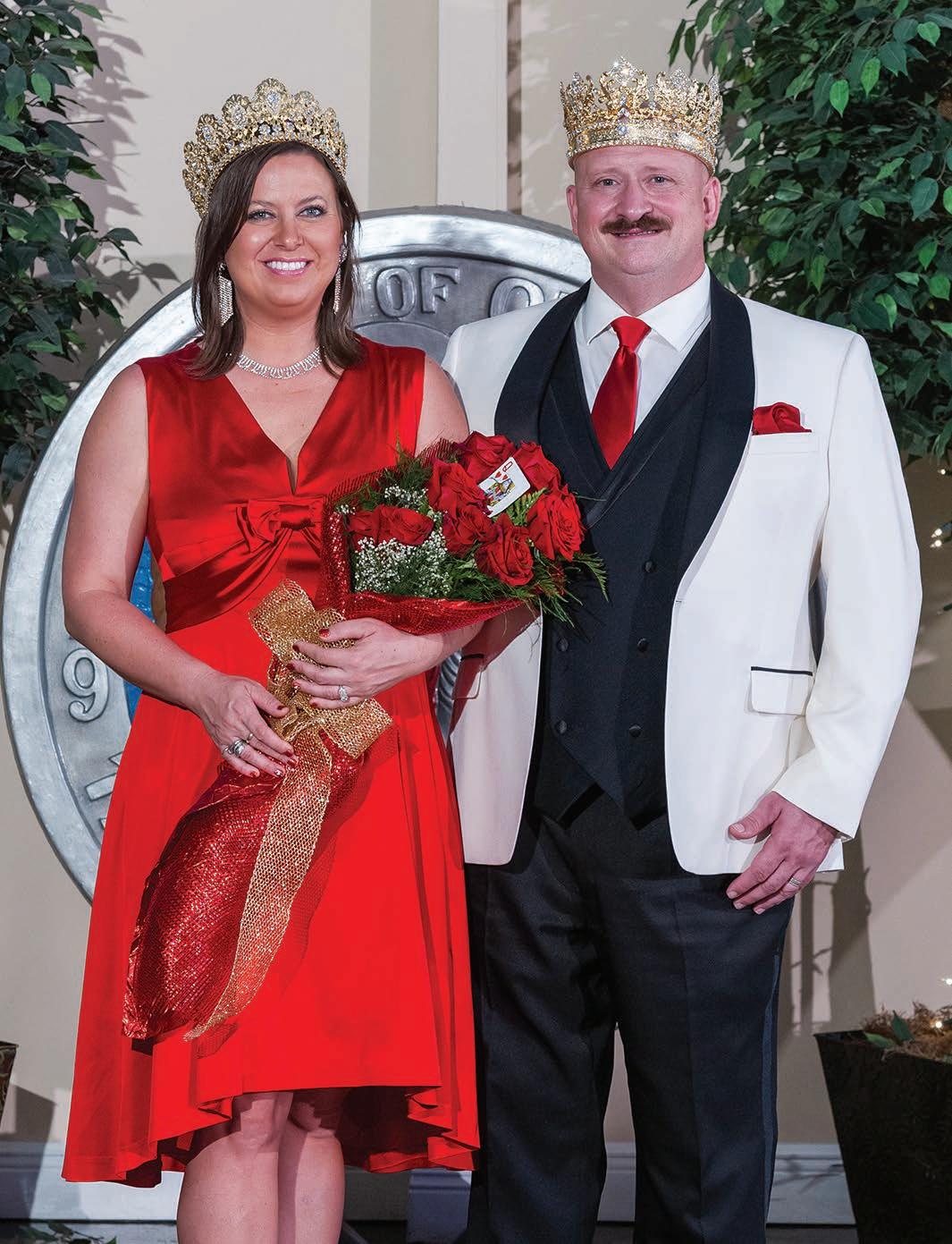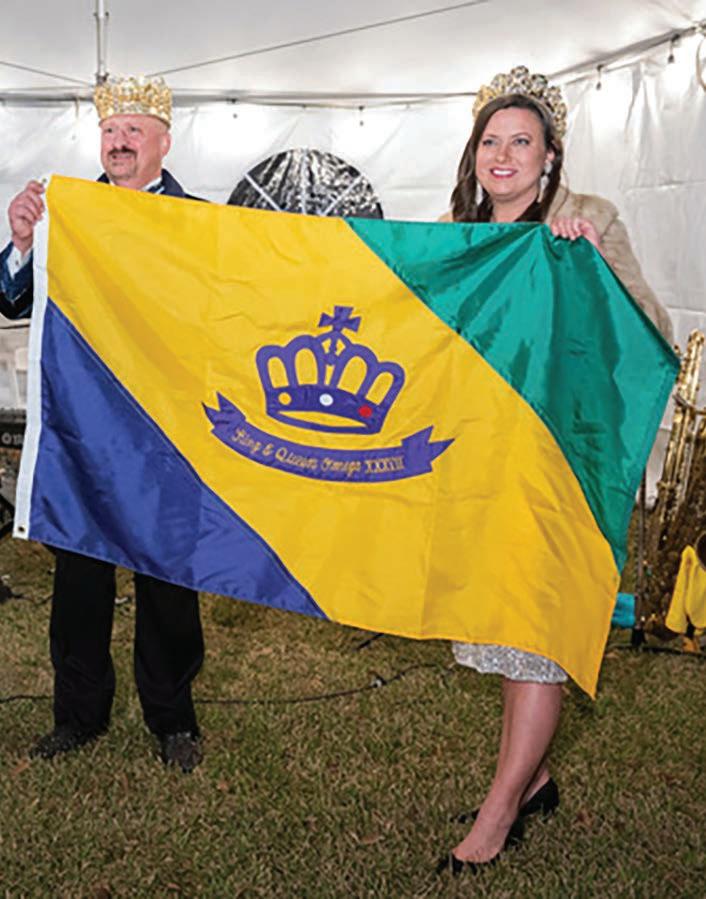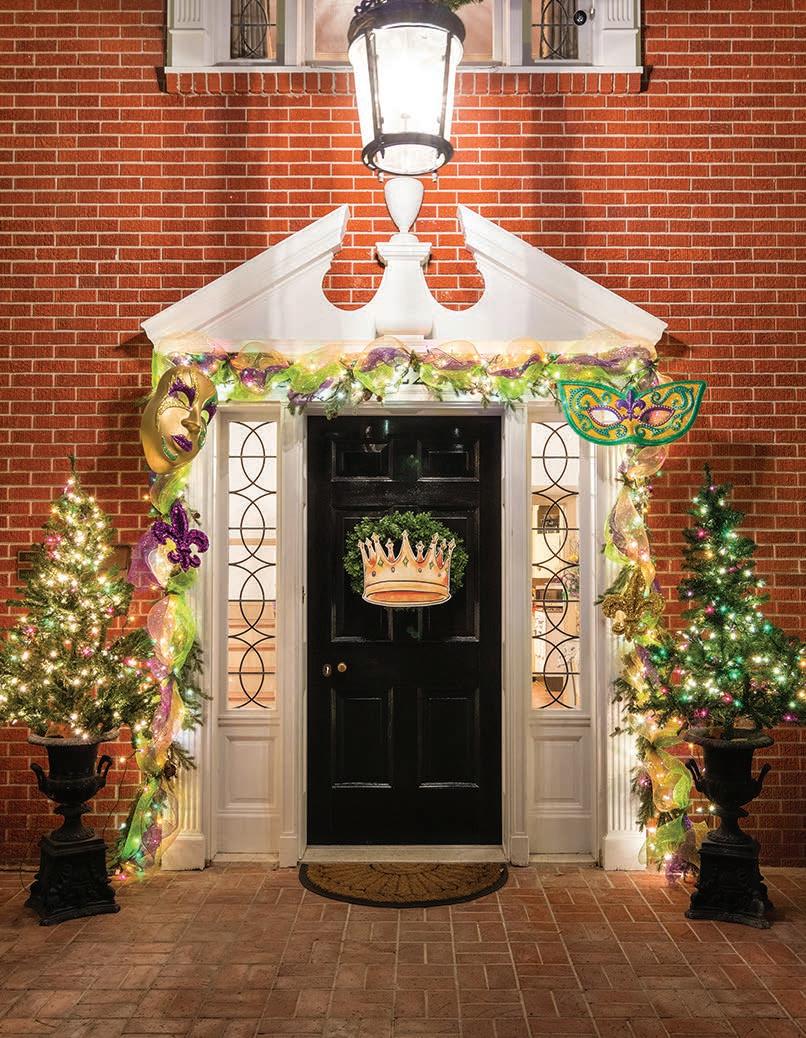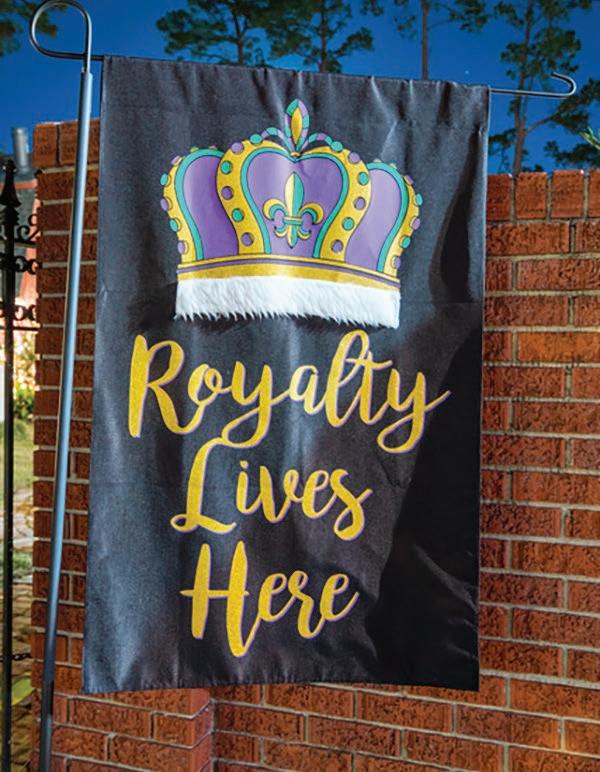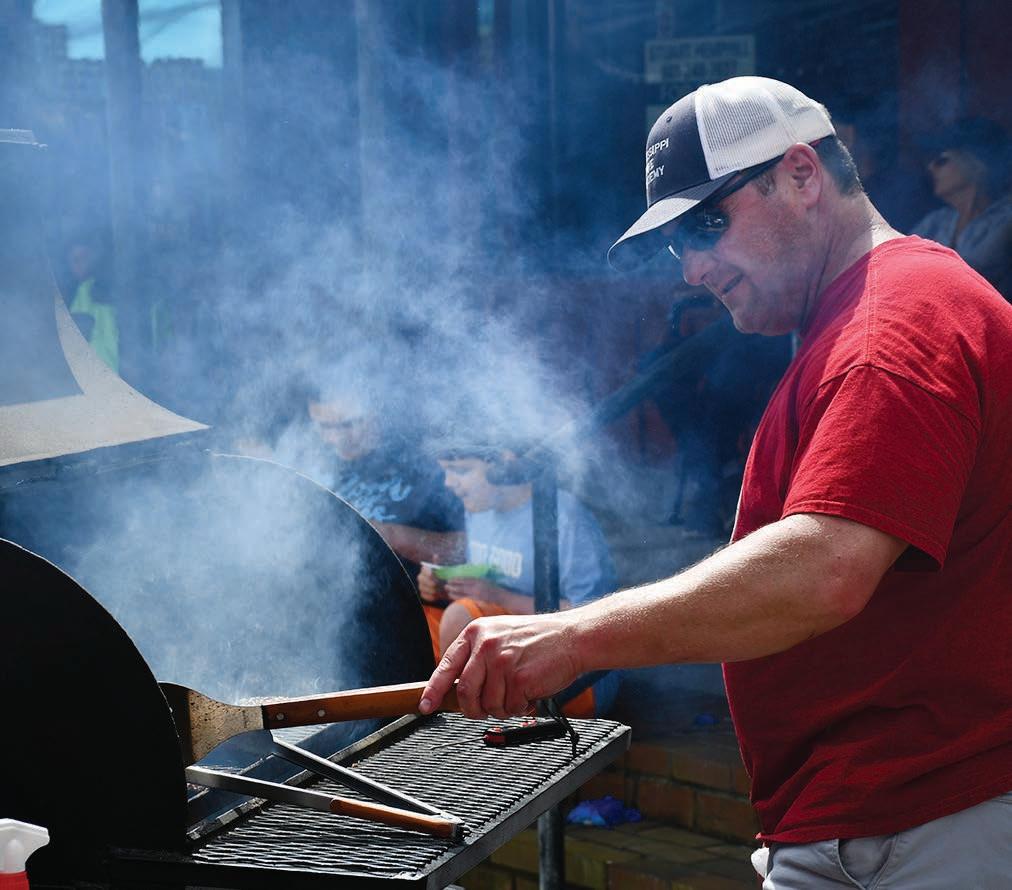
8 minute read
12th Annual Smokin’ on the Tracks
ARTICLE & PHOTOS | Bill Perkins
It begins per tradition on the evening of Friday, April 21, 2023, with a block party of live music, arts, and food vendors from 5:00 until 10:00 p.m. The barbeque contestants will be in place and already preparing and smoking their entries for judging the next day. The music always sounds even better with the pleasant aroma of mouthwatering meat on the smoker wafting throughout downtown Summit.
Saturday, April 22, is the big day. The BBQ cook-off, car show, and arts and food vendors are ready to welcome visitors from 10:00 a.m. until 7:00 p.m. Judging takes place about mid-day with the results announced soon thereafter for winners of the BBQ teams and the car show.
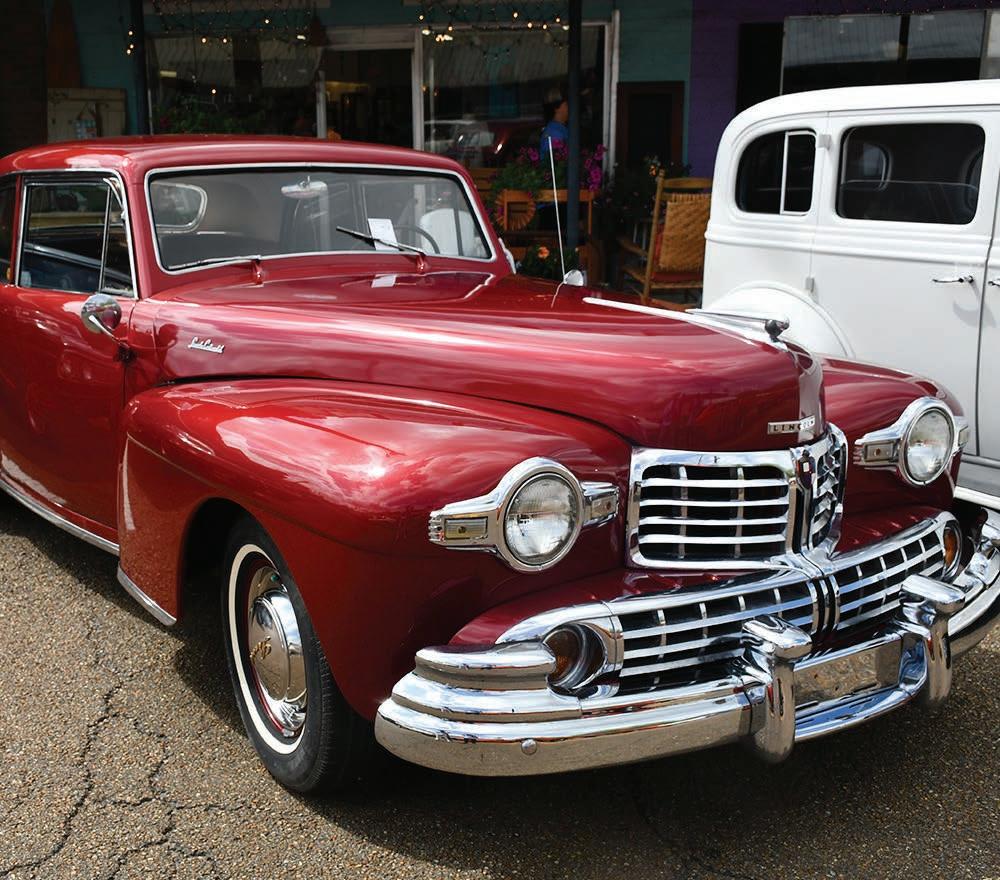
Usually, about 20 teams participate in the BBQ contest, most being from the area but some from other states. These folks take their craft very seriously investing small and large fortunes in grilling and smoking equipment and in trucks or RVs to bring to these contests, plus devoting their time and effort in sourcing the best meats, in arranging all the details, and in traveling. Indeed, they are a special breed, passionate for BBQ and competitive by nature.
Smokin’ on the Tracks has recently become a venue for high school alumni of the area to hold homecomings by erecting a tented area for gathering. Many others just look forward to meeting again and again during this annually anticipated event. Among the local bands that perform is "Hippies in the End Zone" comprised mainly of students from North Pike High School. As some graduate from high school, younger talent replaces them; but the show goes on. Thus, each year, their mix is slightly different, an excellent concept and something fans look forward to each year. Many other bands like "Ransakk" are regular favorites as well. Dancing in the street is encouraged!
This event has generated more than $150,000 which has been spread among local charitable organizations benefiting the community. It's an opportunity for all ages to enjoy getting out and supporting a great cause.
For information regarding the car show, contact Lonnie Cox at 601-248-0083. For information on the event, find Smokin’ on the Tracks on FB or search smokinonthetracks.org.
After living twenty-eight years abroad, Bill Perkins returned to his hometown Brookhaven, Mississippi, where he enjoys writing, photography, and travel.



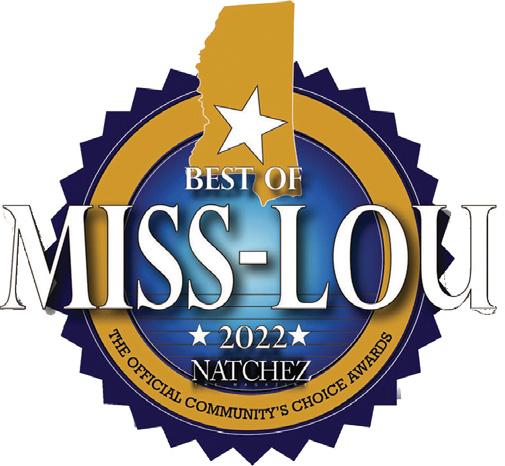
In 1773, the King and Swayze families settled in Adams County after more than a hundred years of religious persecution in England and the New World. The two families, who were Quakers, immigrated to Salem, Massachusetts, in 1635 in hopes of escaping the Church of England. They were not a part of this church because they did not share the same beliefs. That’s why they were called Separatists.
However, religion in Salem still was run by the Church of England; so the two families moved to Long Island, New York, then to New Jersey, and finally to Natchez, Mississippi, seeking to avoid religious discrimination. Once they reached Natchez and settled in its Kingston area, the King and Swayze families still ran into religious harassment because of the Spanish controlling the territory; but people like the Reverend Samuel Swayze helped bring Protestantism to Mississippi.
The original Jersey Settlement Community was established in 1773 by the families of Justus King, Obadiah Brown, Samuel Swayze, Nathan Swayze, and Richard Swayze. Caleb King surveyed the land and then laid out and established the town of Kingston about a mile from the original Jersey Settlement.
The first church in the settlement was a Congregationalist Church organized around 1773 by Reverend Samuel Swayze, who had been a Congregationalist minister in New Jersey. This church continued until his death some twelve years later. Because the church had no actual meeting house, the congregation met in homes, sometimes secretly for fear of the Spanish, who did not allow freedom of worship. Tradition states that Reverend Samuel hid his Bible in a hollow tree on the banks of a small stream still known as Sammy's Creek.
In 1800, the Kingston Methodist Church was organized by Reverend Tobias Gibson. Its seven original members were Caleb King, Gabriel Swayze, Lydia Swayze, Prudence Cory, Deborah Luce, Prudence Varadoe, and Eliza King. The Kingston Methodist Church building was constructed in 1856. Caleb returned to New Jersey to marry Mary Swayze, daughter of Richard Swayze; and about 1775, he returned with his wife to the Jersey Settlement.
In 1940, the Descendants of the Jersey Settlers held their first annual reunion at the Kingston Church, and the reunion continues to be held at the Church each year in April. In 1982, the church was placed on the National Register of Historic Places. Over the years, the organization and individual members have provided monetary help to the church, especially when it recently was renovated.
This year will be the 250th Anniversary of the Jersey Settlers Migration to Mississippi with the Descendants of the Jersey Settlers commemorating this milestone at its reunion on April 21-23, 2023. On Friday, a fish fry will kick off the celebration at Commencement Plantation with host Billy Aguillard. Saturday will offer various events including a genealogy workshop in Natchez at Judge George W. Armstrong Library with Vice President of Genealogy Charlotte Britt, and concluding the weekend will be a service at Kingston United Methodist Church followed by a potluck lunch on the grounds.
For more information regarding the 250th anniversary, contact Nikki Shaifer, DJS President and descendant of Richard Swayze, at Nikkishaifer.djs@gmail.com or 601.597.9158.
ARTICLE | Lucien C. Gwin III
In the last twenty years, Bed & Breakfast rentals as well as home rentals through Airbnb, VRBO, and HomeAway have become incredibly popular for renting out one’s bedroom, home, or weekend home and helping to pay the cost of a mortgage.

These ventures are, of course, rental agreements mostly meant for very short-term periods, i.e., weekend get-aways. However, are such arrangements to be considered business ventures, i.e., commercial operations; or are they to be construed as a residential property use and why is this important? It is important because often restrictive covenants of most subdivisions require the premises to be used for residential purposes only and NOT for commercial ones.
So, if you rent your home out for occasional weekends and you make money in the process, are you violating some restrictive covenant that has been incorporated with your deed; or are you violating some zoning ordinance of a city that requires “residential” in its zoning regulations?
In my hometown of Natchez, Mississippi, B&B and VRBO rentals are quite popular and done every day. However, what happens if your neighbor gets tired of all of the cars being parked all over the street every weekend; and he decides to impose the “residential” requirements upon your little business venture? I have seen this happen.
The question of whether renting one’s home occasionally through B&B or VBRO for compensation is a residential venture or commercial venture has now been answered for the first time by the Mississippi Supreme Court. In the case of Lake Serene Property Owners vs. Clyde Delbert Esplin in Hattiesburg, a homeowner’s associates took offense at a resident of the subdivision who rented out his home occasionally on weekends to tenants and visitors.
The Lake Serene development has been in existence for over forty years and has some beautiful high-dollar homes. The restrictive covenants require all properties to be used for “only residential” purposes.
B&B: Residential Versus Commercial j
The Mississippi Supreme Court stated that this was a case of “1st Impression” in Mississippi meaning no prior case law exists in the state upon which to base a decision. In such situations, the Court often looks to other states to review those states' holdings and reasonings behind their decisions in similar cases. The Supreme Court at first focused on the fact that the phrase “residential purposes” was not really defined in the covenants themselves.
The Court then looked at Alabama’s definition of “residential purposes.” Alabama defines “residential purposes” as “a place of abode, even if the person occupying the abode is renting there temporarily during a vacation.”
The Court looked at cases in Missouri and Maryland whose courts found “that so long as the property is being used in a way that an abode would typically be used, such as for eating, sleeping, and bathing, it is being used for residential purposes.”
Likewise, Texas determined that “receiving income for a rental property did not constitute commercial activity when all commercial aspects of the rental property were conducted online. No funds were exchanged on the property and no offices or signages were present on the property.”
The Mississippi Court also took into consideration, the duration of the stay. The Court stated, “The property was being used as a place of abode, Esplin residents rented out his house anywhere from one day to thirty days. All sales transactions were conducted online.”
However, other states such as Pennsylvania and New Hampshire have previously found that short-term rental of homes are “transient” in nature and not residential. But the Pennsylvania and New Hampshire cases involved zoning regulations and not restrictive covenants that may run with a particular subdivision.
Finally, the Mississippi Court stated that the length of time of the rental is not as important as “how the property was being used.” In Natchez, B&B and VBRO are regulated by city code, which can redefine “residential” versus “commercial” or properties where there are NO restrictive covenants. Most of the older homes in Natchez are governed by code and not covenants.
Often times restrictive covenants regulate subdivisions prohibiting all forms of commercial activity. Before you decide on a B&B or VBRO for your home, review your deed as well as your city’s and court’s zoning regulations.
Lucien C. “Sam” Gwin III was admitted to the Mississippi Bar in 1981 and has been practicing many aspects of the law at the firm of Gwin, Punches & Kelley in Natchez, Mississippi, ever since.



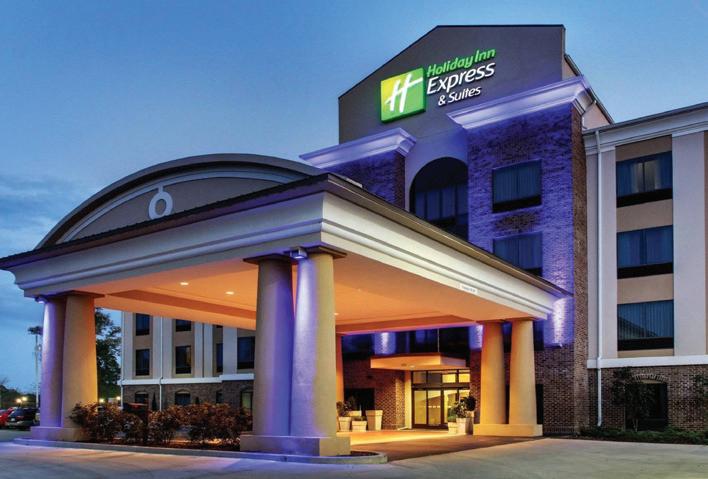
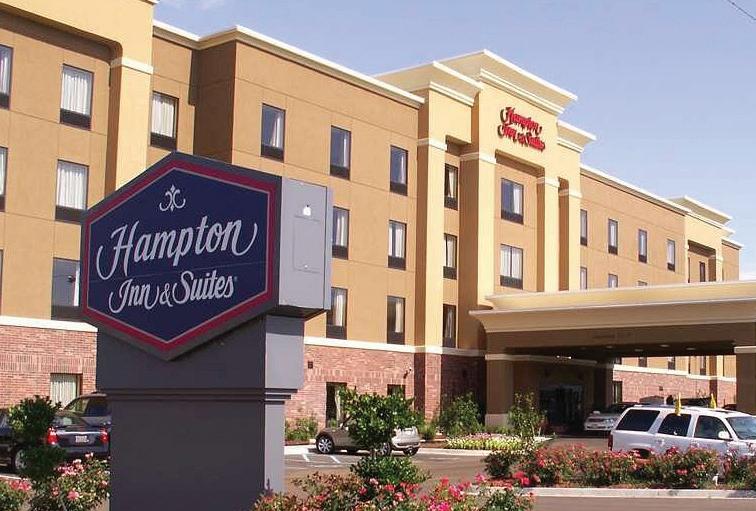
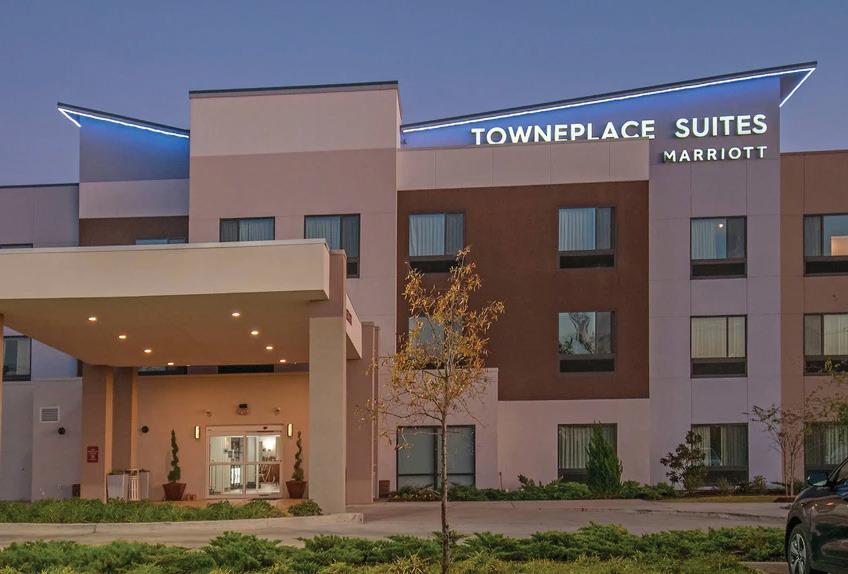
Hayes Family Reigns during Krewe of Omega Mardi Gras

ARTICLE | Cheryl Rinehart
PHOTOS | Phillip Colwart
The Krewe of Omega celebrated the beginning of Carnival season with a lavish Twelfth Night party.
The party was hosted by 2023 King XXXVII Bradley Hayes and Queen XXXVII Sara Hayes on January 6, 2023, at their lovely home in Hammond, Louisiana. The front entrance was framed with Mardi Gras-themed garlands that were echoed in the foyer’s staircase banister.
Throughout the home, sparkling arrangements featured the traditional purple, gold, and green colors; a variety of masks; and vintage Mardi Gras jester dolls. The exterior of the home was decorated with numerous white lights in trees and shrubs interspersed with Mardi Gras colored twinkle lights.
Wrought iron candle holders, made by the queen’s brother, lined the drive to give the guests a warm greeting. Speaking of warm, numerous heaters were spread about the rear of the home to keep guests comfortable on the chilly night. The full moon provided a bright spotlight for the gathering, showing the numerous guests enjoying conversation and cocktails before the meal.
Entertainment was provided by the Eddie Veatch group. The royal hosts treated their guests to a sumptuous buffet featuring a cochon de lait (roast pig), grits and grillades, gumbo, oysters on the half shell, and shrimp cocktails prepared by Chef Ryan Haigler. Omega’s Captain, Leslie McKnight, provided the king and queen with their personal Mardi Gras flag proclaiming them the 37th Royals of Omega. The meal concluded with traditional King Cake provided by Hammond’s own Candlestick Bakery, and the lovely evening came to an end with a festive second-line promenade through the happy, satisfied revelers.
The Krewe of Omega King and Queen were presented at the Omega Ball on January 28, 2023, and thereafter were celebrated in Hammond’s Omega Parade on February 10. This krewe, formed in 1986, is a co-ed Mardi Gras organization in Tangipahoa Parish (Hammond, Louisiana). A year-round social organization, its members volunteer in many community service projects that the krewe supports throughout the area; and, of course, during Mardi Gras season, the krewe holds various events offering a New Orleans experience for Tangipahoa and surrounding parishes.
For additional information, visit kreweofomega.org.
